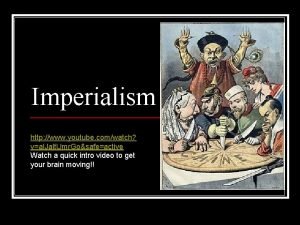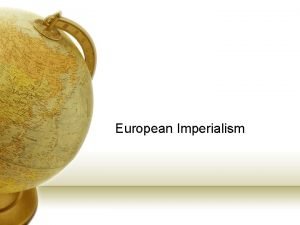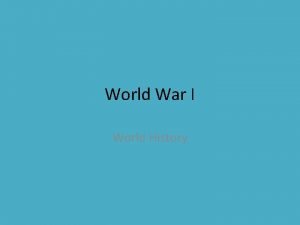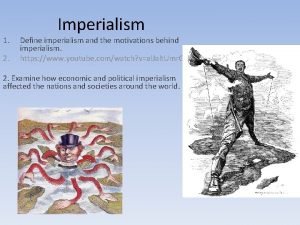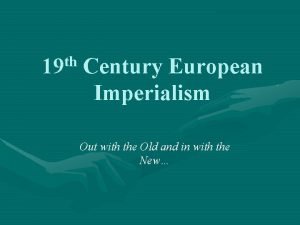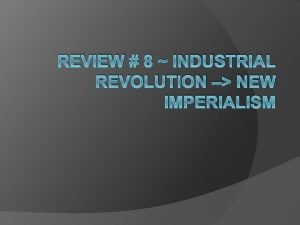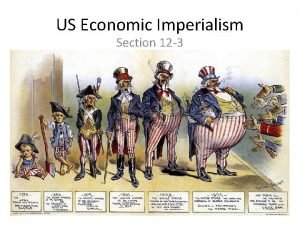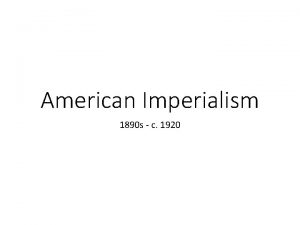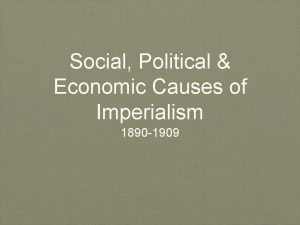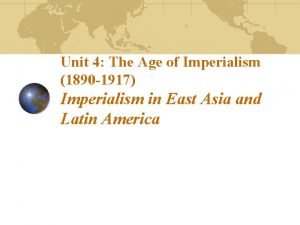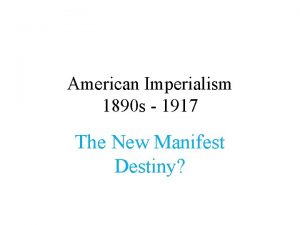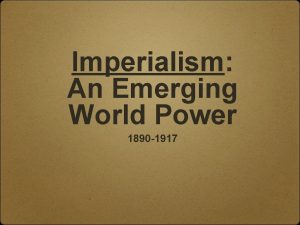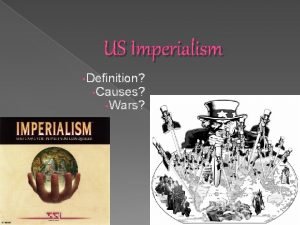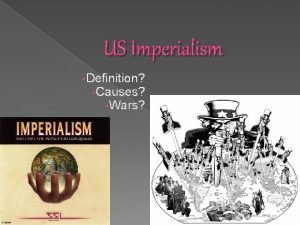IMPERIALISM 1890 1917 CAUSES OF IMPERIALISM Economic gain










- Slides: 10

IMPERIALISM 1890 -1917

CAUSES OF IMPERIALISM • Economic gain – Industrialists want raw materials; extractive economies • Militarism – Colonial powers seek bases for naval forces to protect global trade – Alfred T. Mahan wrote The Influence of Sea Power Upon History; believed great nations had great navies • Nationalism – Moral duty to spread culture

FIRST STEPS • Matthew Perry – opened Japan to trade with U. S. • Seward’s Folly – bought Alaska; rich in timber, oil, and other resources • U. S. acquires Hawaii – American settlers had interests in sugar – When Hawaii’s Queen Liliuokalani tried to eliminate American influence there, U. S. settlers overthrew her and set up Republic of Hawaii – U. S. annexes Hawaii in 1898

THE SPANISH-AMERICAN WAR • Causes of the War – Cubans rebel against Spanish rule – The U. S. S. Maine blows up; “Remember the Maine” becomes battle cry • Yellow Journalism – William Randolph Hearst & Joseph Pulitzer newspapers heightened dislike of Spanish government – Yellow Press inflames public opinion; named after comic-strip character yellow kid

THE BATTLE • First Action – Commodore George Dewey takes the Philippines • U. S. forces win in Cuba – Theodore Roosevelt and the Rough Riders seized San Juan Hill; helped secure surrender

AFTER THE WAR • Teller Amendment – U. S. disclaimed desire to annex Cuba • Treaty of Paris – Spain withdrew from Cuba – U. S. received Puerto Rico, Guam, and the Philippines • Annexation of Philippines – Emilio Aguinaldo led uprising against U. S. control

United States in East Asia • Sphere of influence – European powers had privileged access to Chinese ports and markets. • Boxer rebellion – secret society formed to drive outsiders away. They killed foreign missionaries and besieged the foreign diplomats district. • Open Door Policy – John Hay proposed equal treatment of commerce from all nations regarding China.

Japan • Russo-Japanese War – Japan attacked Russia. • Theodore Roosevelt won a Nobel Peace Prize for negotiating a peace treaty with Japan and Russia • Gentlemen’s Agreement – U. S. ends segregation of Japanese children; Japan limits emigration to U. S. • Great White Fleet – armada of 16 white battleships on a “good will cruise” around the world.

Latin America • Platt Amendment – brought Cuba within U. S. sphere; prevented Cuba from signing treaties without U. S. approval and required them to lease naval bases to U. S. • Panama Canal – shortened traveling distance from west coast to east coast of U. S. by 8, 000 miles. – To gain canal, the U. S. supported a Panama’s rebellion – Battled malaria and mosquitos

Diplomacy • Roosevelt Corollary – updated the Monroe Doctrine; U. S. would assume police power in case of Latin America “wrongdoing” • Big Stick diplomacy – Theodore Roosevelt; depend on strong military to achieve America’s goals; “speak softly and carry a big stick” • Dollar diplomacy – William Howard Taft; dollars for bullets; increase U. S. investments • Moral diplomacy – Woodrow Wilson; promotes “human rights, national integrity, and opportunity”
 Natural resources imperialism
Natural resources imperialism Old imperialism vs new imperialism chart
Old imperialism vs new imperialism chart Old imperialism vs new imperialism
Old imperialism vs new imperialism Causes of new imperialism
Causes of new imperialism Causes of imperialism
Causes of imperialism What were the causes of imperialism
What were the causes of imperialism What were the causes of imperialism
What were the causes of imperialism What were the causes of imperialism
What were the causes of imperialism Causes of new imperialism
Causes of new imperialism Causes of imperialism
Causes of imperialism Economic imperialism in latin america
Economic imperialism in latin america



